 Call to Prayers |
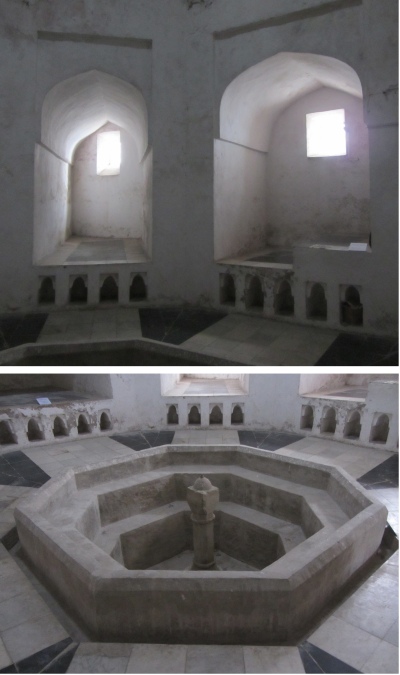 One of the Dips at Hamamni Persian Baths |
A final breakfast on the roof, then an intricate packing exercise, before heading off to the Hamamni Persian Baths. I arrived there shortly after 08:30, the opening time mentioned by the chap I had met there yesterday. The Baths were shut, but hey, this is Africa, why should I expect things to follow the precision clockwork that the western world imposed upon itself.
I walked around a few blocks, and returned - still shut. So I sat down on a baraza opposite the baths and watched the world go by, jamboing everybody who passed, many responding with more than a simple "Jambo."
One chap stopped and sat down next to me. He was Haji-Klamis Mdungi. "Where are you from?" he enquired. "England," I replied. "Birmingham, Brighton?" he continued. "No, Ipswich," was my succinct reply. "That is Brighton, yes?" he pushed. "No, Ipswich, 70 miles north east of London," I insisted. "Ah, Brighton," was his response. I let it go.
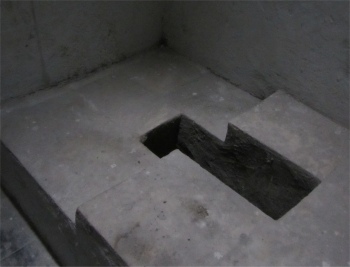 Latrine at the Baths |
A woman turned up and opened the baths. Haji had been true to his word. Before we parted company, Haji insisted on writing down his email address, phone number, recommendations about him in the Rough Guide Book, including page number, his specialisms such as history, culture etc. Indeed I had a complete C.V.
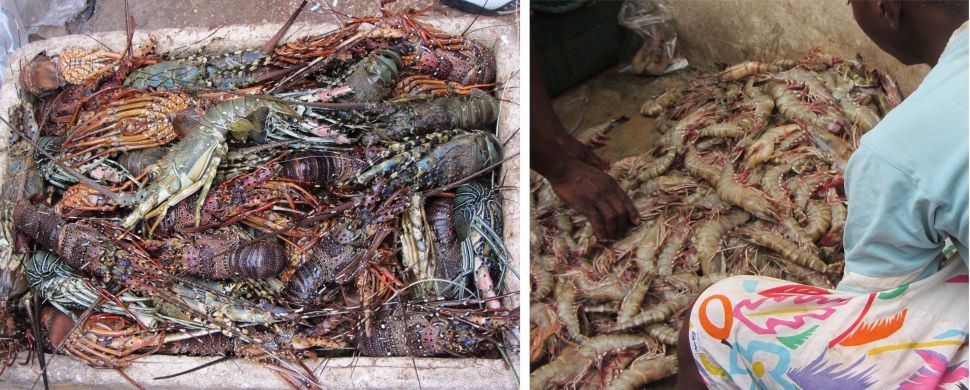 Lobsters and Prawns at Darajani Market |
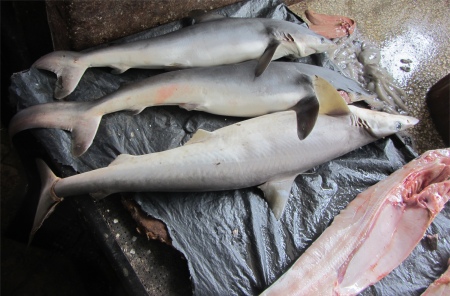 Market Fish |
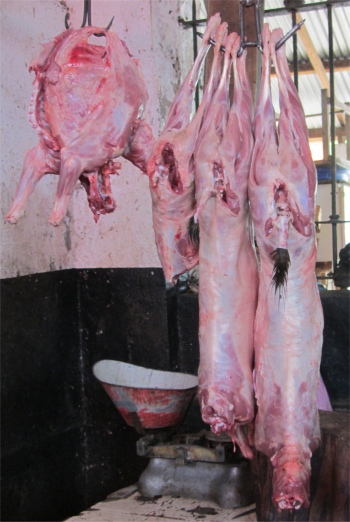 Market Meat |
 Pulses |
At the southern end of the market area, in the central reservation of an arterial road, a young guy operated a cement mixer next to a large hole that was being filled. The sand and ballast were piled 40m away down the same central reservation. Three women were working away, filling buckets with sand or ballast, and then carrying them on their heads to the cement mixer. I don't see that too often in Britain.
A tall, slim and very black-skinned guy wearing a blue robe walked by. When he noticed me, he burst into smiles and laughter, dirty mischievous laughter to be precise, and he made a bee-line for me. He thrust forward his hand to shake mine. As we were locked together, his laughing mouth revealed the weirdest set of teeth I've ever seen. They were severely non-uniform, and a few were missing, with much decay in in the remainder. Nothing new in that. But I was amazed at some of his teeth which were a mottled white and turquoise. They had an almost hypnotic effect on my eyes, and it took an effort to divert my attention from them.
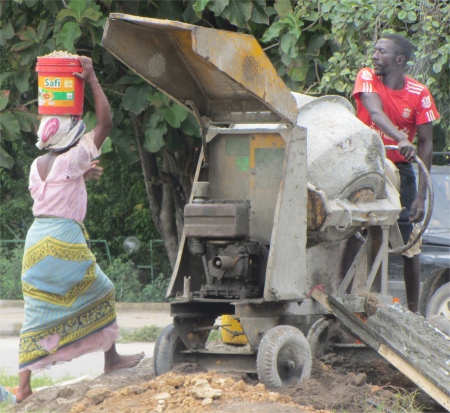 Bare-Footed Woman Labourer |
I could not resist the temptation to enter the hinterland again, and explore a new route across it. I emerged after a while in Jaws Corner again, and of course I had to sample the coffee once more. A different old man was on coffee duty this morning. While I sat on the baraza, a very long precession of people proceeded through the square, all in their Sunday best. I presumed they had all just left St Joseph's Cathedral nearby, and were heading across to the bus station.
Forodhani Gardens were next on my agenda for one last lingering look over the inviting sea, before walking up to Stone Town Cafe; Sally recommended trying the quiche here, "Best in town," she had told me. There was a space at the end of a long table, where I plonked myself. I ordered spinach quiche with salad, and spiced tea (ginger, cardamom and cinnamon). The food and drink were exquisite.
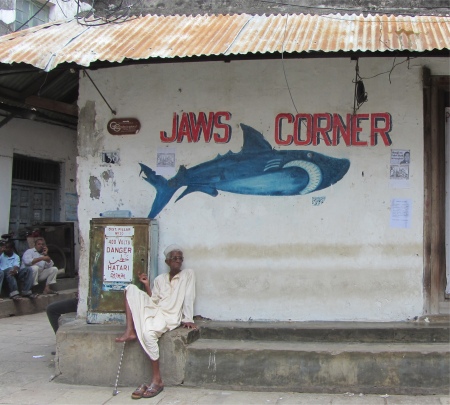 Jaws Corner |
At the other end of the table, an English middle-aged bloke sat in conversation with a young African who I remembered seeing earlier at Jaws Corner. They were joined in a short while by two more Africans, and all four fell into deep discussion about three passports that they were examining between them. One passport was Omani, the other two were British, and I gathered from their comments that young women's' photos were inside. Shame on me for eavesdropping, but they were rather loud. I will never know the story behind the passports; probably best I don't.
With the appointed hour rapidly approaching when I would have to leave this beautiful island, I headed down to our old haunt and lived it up with a mango juice. Entertainment was provided by the ship that dropped its ramp here a few days earlier. A tractor was trying to get up the ramp. Its engine must have been on the decline since it needed the assistance of eight burly guys to push it up the incline.
Cool music played out from the bar, everybody smiled, the sun shone and it seemed a shame to be leaving such a heavenly place. Thunder rumbled in the distance.
One of the older waiters came up to me and asked, "Where is she?" as he looked back to the bar expecting "she" to enter. "Who?" I asked. "Your daughter." I smiled and explained she had gone back to Kenya. He returned a warm smile and went about his business.
I returned to Flamingos, collected my gear, and the receptionist's brother became an impromptu taxi driver. Soon I was on the last ferry back to Dar es Salaam. It was full to capacity.
The catamaran sounded its horn a couple of times, revved her engines, and slowly reversed out into the open harbour. A much larger roll-on, roll-off ferry glided past us and berthed. Our craft then slowly returned back to its berth. Did I pick the harbour cruise by mistake? I checked the time, there was still 10 minutes to go until departure time. Thoughts of Precisonair flooded back. Apparently the wash from the larger ferry can cause severe damage to the catamaran I was sitting on, so the catamaran gets out of the way if a big ship pulls in alongside it.
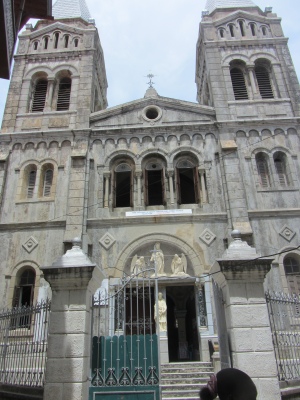 St Joseph's Cathedral |
We managed to slip our mooring eventually, and our craft wasted no time in picking up speed. As we sped over the ultramarine sea, Zanzibar and its collection of islands slipped behind and soon dropped below the horizon. We had really enjoyed our chill out on the gorgeous, lush island, abundant in fish and fruit plus the tail end of a spice reign. Sally had picked three excellent diverse locations for us to spend time in so that we could gain a more balanced impression of Zanzibar, ranging from almost desert island to an historic town, and each were brilliant. In its heyday, Zanzibar had been a seafaring hub, the "market" of East Africa, though relics exist to remind us that the trade hasn't always been ethical. But what made the island really special was the people; they were all a bubbly, friendly, happy crowd offering warm, ready smiles freely, all sociable and eager to chat. Indeed the island had a reputation for its peacefulness and friendliness - a real green gem of a place. I for one could easily spend more time there, and would recommend it to anyone.
I tried not to dwell on my leaving and set about people watching. The bulk of passengers were young Africans, all excitably chatting, joking and laughing. The older African generations were more subdued, and appeared to be dressed in their Sunday best outfits. There was a smattering of mzungu like me on board. I had the pleasure of observing at close quarters, a woman in her late 20s, sitting one row in front of me on the opposite side of the aisle by which I sat. The chap next to her I deduced to be her husband, though they barely exchanged two words on the whole journey. In her left hand she held a fragment of a broken mirror. Her right hand was engaged in progressing around her face, slowly squeezing all her spots. After 40 minutes of zit splatting, she got bored and elevated herself to scratching off, with her fingernails, the orange nail varnish she was wearing. I dozed off at this point, the excitement was killing me.
Dar es Salaam loomed larger and larger, and soon I was showering in the same hotel I had done so 16 days ago.
I decided to venture out in the evening to a Thai restaurant Dan had mentioned. Walking the streets of Dar es Salaam in the dark was a different experience to walking in Zanzibar at night. There was not much of the "Jambo" banter that I enjoyed on the island. Dar es Salaam was full of dark areas and many dark shadows, with shadowy characters lurking inside them. I resorted in places to walking down the middle of the street. This is not as absurd as it may sound, many people did so. There were few pavements, and often they were blocked by street vendors or groups of women with small kids, many of them begging. The pavement more often than not was a dust track full of rubble, and in some parts it was used as a dump for rubbish. Perhaps I'm doing the city an injustice.
I found the restaurant, enjoyed a delicious meal overlooking the brightly lit ships moored, a contrast to the disappointing daytime scene.

